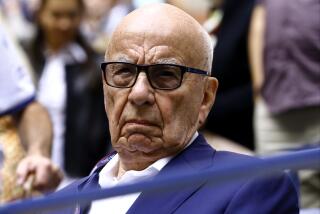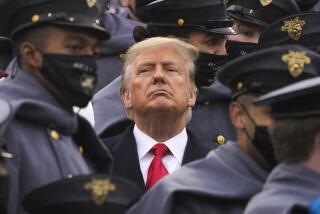The Rumsfeld show’s finale a classic, by golly
- Share via
WASHINGTON — For much of the last six years, a question-and-answer session with Donald H. Rumsfeld was the best show in town. The combative Defense secretary’s bristling self-assurance made the Pentagon Briefing Room one of the hottest seats in Washington.
The Bush administration’s erstwhile rock star delivered his last major performance Friday, as feisty and quotable as when he began. At a Pentagon town hall, Rumsfeld delivered with style, gamely teasing questioners, popping off trademark “by gollys,” and quoting Churchill, invoking George Washington and expounding on “eurocommunism” of the 1970s.
Although the Senate has confirmed Robert M. Gates -- a decidedly more measured and reserved public speaker -- to serve as the next secretary of Defense, he will not be sworn in for nine more days. For a little while yet, Rumsfeld remains in the building and in charge.
But he is not due to appear before Congress again, and his public affairs staff says there will be no goodbye news conferences. Rumsfeld said Friday’s town hall, his 42nd such appearance answering questions from military personnel during his second Pentagon stint, would be one of his last public appearances.
In some respects his last town hall was a greatest-hits collection. Rumsfeld managed to riff on many of his favorite topics: the electricity supply in North Korea, the fashionableness of “eurocommunism,” the near-sacking of George Washington, the media strategy of insurgents and the failure of the American press to chronicle the good news from Iraq.
As unrelated as those topics may seem, Rumsfeld routinely evokes them to defend the war in Iraq or his own leadership.
North Korea’s lack of electric light, his favorite set piece, is his example of what happens to those who reject democracy. People who thought eurocommunism offered a good economic system during the Cold War, Rumsfeld suggests, were as misguided as opponents of Iraq policy.
Critics may question America’s war leaders, but Rumsfeld wants people to remember they also questioned the father of the country at the beginning of the revolution. And when the news media report on insurgent attacks against civilians, it is -- in the Pentagon’s view -- helping the enemy try to weaken the will of the American people.
The public’s doubts about Iraq and the need for America to maintain its support for the war have been a regular theme of Rumsfeld’s public appearances for much of this year. And Friday, he used the stage to plead for more time in Iraq. He said there was “an impatience in the United States and Congress.” But, he said, the larger fight against violent extremism, in Iraq and elsewhere, was going to take patience and perspective.
“We have invested a whale of a lot in the Afghan situation and the Iraqi situation,” he said. “And to pull out precipitously and inject that instability into the situation there, in that country and that region, I believe would be a terrible mistake.”
By his own count, Rumsfeld has held 613 news conferences. And although on Friday he criticized coverage of Iraq, as usual, he also singled out the Pentagon reporters for praise.
“As hard as it may be to believe,” Rumsfeld said Friday, “I even miss our press conferences.”
Actually, it’s not hard to believe at all. From the start, Rumsfeld seemed to relish his time in front of reporters. The news conferences during the beginning of the Afghanistan war, where Rumsfeld jumped all over any perceived skepticism in a question, made him a household name.
But as the Iraq conflict evolved from a decisive march to Baghdad into a grinding civil war, more of the public began to view Rumsfeld’s act as stale. To them, the unchecked confidence seemed ill-suited for an honest discussion of what was happening in Iraq -- less a sign of strength than a signal that he did not want to listen to critics.
By the end, his piques at the press were often viewed as attacks on all war skeptics. On Oct. 26, his last formal Pentagon news briefing, Rumsfeld told a reporter asking about benchmarks for the Iraq government “to just back off, take a look at it, relax, understand that it’s complicated, it’s difficult.”
A comment he made at one of the military town halls may have been the beginning of his decline in the public’s eye. On Dec. 8, 2004, while addressing a group of soldiers in Kuwait preparing to deploy into Iraq, he was asked about the Pentagon’s failure to provide armored vehicles. Rumsfeld said armor was being manufactured as quickly as possible. Then he added, “As you know, you go to war with the Army you have. They’re not the Army you might want or wish to have at a later time.”
It was a typical Rumsfeld construction: sharp, insightful and perhaps a touch callous.
For his part, Rumsfeld was not fessing up to many mistakes on Friday. He did say the abuses by American soldiers at Abu Ghraib had led to his worst day on the job. He avoided directly commenting on the Iraq Study Group and its dire assessment of the situation in Iraq, using one of his favorite tactics of claiming he had not read “the entire book.”
As is his usual practice, Rumsfeld dodged an explicit question about how history would judge him. But he did, in his opening remarks, express hope that “the perspective of history” would view his choices of the last six years favorably.
“I wish I could say that everything we’ve done here has gone perfectly, but that is not how life works, regrettably,” he said. “The hope has to be not perfection, but that most decisions, with the perspective of time, will turn out to be the right ones.”
More to Read
Sign up for Essential California
The most important California stories and recommendations in your inbox every morning.
You may occasionally receive promotional content from the Los Angeles Times.













